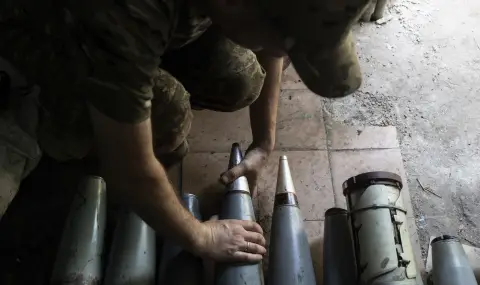On August 20, Ukrainian forces continued their attacks in Russia's Kursk region and made further progress, destroying at least one pontoon bridge over the Seym River, News.bg quoted.
Some Russian bloggers claim that Ukrainian forces have captured Vishnevka (southwest of Korenevo and 14 km from the international border). This coincides with the Russian Ministry of Defense (MoD) report of August 19, which tacitly acknowledges this.
Russian bloggers also claim that Russian forces have regained some lost ground and advanced in the fields south of Safonovka (northeast of Korenevo and 30 km from the international border).
This is stated in the daily analysis of the Institute for the Study of War (ISW).
Geolocated footage released on August 20 showed that Ukrainian forces had also advanced into forested areas north of Russkoye Porechnoe (northeast of Suja and 20 km from the international border). This is consistent with maps by Russian bloggers that depict Ukrainian progress along the entire administrative border of Russkoye Porechnoe.
Ukrainian Commander-in-Chief Colonel-General Alexander Sirsky showed a map showing Ukrainian forces advancing near Viktorivka (southwest of Korenevo); between Snagost and Korenevo; northeast of Korenevo in the areas north of Kremianoe and northwest of Pogrebki; east of Malaya Loknya (north of Suja); and southeast of Suja.
ISW will use the boundaries of this map to update its estimate.
Ukrainian officials continue to clarify some of the objectives of the Kursk Oblast operation and report on additional Ukrainian progress. Ukrainian commander-in-chief Colonel-General Alexander Sirsky said on August 20 that Ukrainian forces had advanced between 28 and 35 kilometers into Kursk Oblast and that they controlled 93 settlements (1,263 square kilometers).
Syrsky also noted that Ukrainian advances in the Kursk region are putting pressure on Russian forces to transfer parts of undefined sectors to the front line. This could affect the pace and prospects of Russian offensive efforts in Ukraine.
Syrsky added that Ukrainian forces aim to create a buffer zone on Russian territory to prevent Russian forces from shelling the Sumy region and to "overtake" the efforts of the Russian forces as a whole. Ukrainian President Volodymyr Zelensky said on August 19 that Ukrainian forces' pre-emptive defense in Kursk Oblast was the most effective countermeasure against Russian forces, and that Ukrainian forces had largely "cleared" the Russian border area near Sumy Oblast by Russian forces.
The Ukrainian General Staff announced on August 20 that they are exhausting the combat potential of the Russian forces.
Vice-Chair of the Commission on Ukraine's Integration into the European Union (EU) Maria Mezentseva-Fedorenko said on August 19 that Ukraine is preparing a new round of prisoner-of-war and civilian hostage exchanges with Russia and that the operations in the Kursk region comply with international humanitarian law right.
The Russian military command continues to complicate and bureaucratize its hitherto ineffective command and control structure in response to the Ukrainian offensive in the Kursk region. Russian Defense Minister Andrey Belousov announced on August 20 that he had appointed Russian Deputy Defense Minister Colonel General Yunus-Bek Yevkurov as deputy head of the "Coordinating Council" to the Russian Ministry of Defense (MoD) on military and security issues in Bryansk, Kursk and Belgorod regions, stating that Yevkurov is already in Kursk region.
Belousov's decision to appoint Yevkurov, who heads the Africa Corps of the Russian MoD and has been the face of Russian military contacts and cooperation with African countries since the dissolution of the Wagner Group in 2023, may suggest that the Russian MoD has removed Yevkurov from his position in Africa. This was before speculation by a Kremlin-linked blogger, and could mean that the Russian Defense Ministry is temporarily deprioritizing defense cooperation efforts in Africa in response to the Kursk Oblast incursion.
In addition, Belousov assigned five members of the Coordination Council to deal with specific issues related to the Ukrainian invasion of Kursk Oblast. He announced that Deputy Defense Minister Lt. Gen. Andrey Buliga would be responsible for resolving logistics, transportation, and assisting civil authorities in civilian evacuations; Deputy Minister of Defense Aleksei Krivoruchko will deal with military-technical provision; Deputy Minister of Defense Pavel Fradkov will be responsible for technology and construction; and that the head of the Main Military Medical Directorate of the Ministry of Defense of Russia, Dmitry Trishkin, will take care of the medical support.
Belousov also announced the creation of the Bryansk, Kursk and Belgorod Group of Forces and said their unspecified commanders and an unspecified representative of the Russian General Staff would be responsible for protecting civilians from drone strikes and other attacks.
The Ministry of Defense of Russia has additionally created a special working group in the National Defense Management Center to monitor the problems in the Bryansk, Kursk and Belgorod regions.
Russian President Vladimir Putin visited the site of the 2004 Beslan school siege on August 20, possibly in an effort to link Russia's "anti-terrorist" response to the Ukrainian operation in the Kursk region with "successful" a Russian anti-terrorist operation in the early 2000s. Putin arrived in the Republic of Alania in North Ossetia on August 20 and visited the Beslan school siege memorial in 2004, as well as the site of the siege itself.
It was Putin's first visit to the school and his second visit to the city since August 2008.
Terrorists linked to the Chechen separatist brigade Riyad-us Saliheen took more than 1,000 adults and children hostage at a school in Beslan over three days in September 2004, killing more than 330 people, including 186 children.
Russia's response to the 2004 terrorist attack was heavily criticized. The European Court of Human Rights ruled in 2017 that local Russian authorities knew about the terrorist attack in advance but failed to increase security or warn the public.
The European Court also said that the response of the Russian security services lacked official guidance
